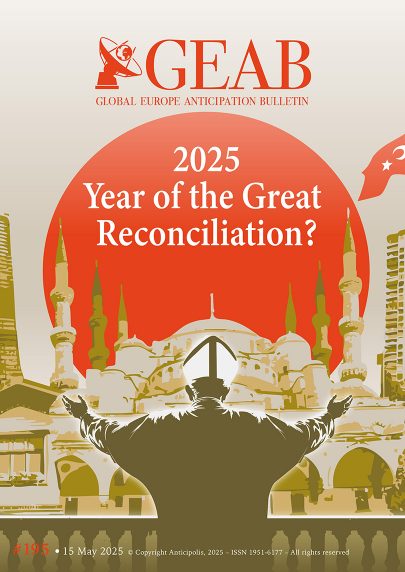GEAB 195

EDITORIAL
The global systemic transition that we have been relentlessly studying for 19 years has taught us that major crises force us to revisit all of history: Bretons Woods, the end of World War II, the Industrial Age, the divisions of the Reformation, the great discoveries of the 15th century, the great empires… the deeper into the crisis we are, the further back in time we are forced to look for explanations for our suffering… like in psychoanalysis.
And it’s to Constantinople/Istanbul that the year 2025 inevitably takes us back, the center of big historical ruptures that are still active today: mainly the great schism of 1054 between the Church of Rome and the Church of Constantinople, the first great fracture in the Christian Church between Catholics and Orthodox, which still structures the geopolitics of the West, as witnessed by the Ukraine war preceded by a mini-schism, with the creation of a Kiev patriarchate, independentof that of Moscow, in 2018[1]; and the capture of Constantinople by the Muslim Turks in 1453, a recurring cause of revenge politics between Muslims and Judeo-Christians, of which the interminable Israeli-Palestinian conflict is one of the latest stigmata. But the time is ripe for (almost) any kind of reconciliation.
In a multipolar world with a strong claim to diversity, the hegemonic method no longer works.
It’s the “e pluribus unum” model[2] that’s gaining ground. And Turkey, with its unique history and the vision of its future underway (which we describe in detail in Terra Cognita 2089 below), is ready to become the symbolic place where the foundations of new modes of inter-state, inter-faith and inter-religious collaboration will be laid…
At the end of the month, Constantinople will host the 1700th anniversary of the Council of Nicaea (today Iznit, a stone’s throw from Istanbul), inaugurating the new pontificate under the auspices of reconciliation and ecumenism (see our article on this subject in this issue).
So Rome goes to Constantinople. What more is there to say? These days, Constantinople is hosting the meeting between Zelensky, Trump and Putin (or their representatives), and perhaps soon even the signing of the Ukrainian-Russian peace treaty[3] (having spoken of the Treaty of Riyadh lately, we return to our initial intuition that this would be the Treaty of Istanbul).
It also holds a key to peace in the Middle East, which will soon be resolved by the Turkish-Israeli antagonism in Syria[4]. It inaugurated the Sunni-Shiite rapprochement, now taken up by Saudi Arabia, thanks to the warming of its relations with Iran in 2020[5]. It is normalizing its relations with Armenia[6] after having contributed with Pashinyan and Aliyev to the resolution of the Nagorno-Karabakh conflict, formalized since March 2025 by a real agreement between Armenia and Azerbaijan[7]. It has just obtained from Öcalan, the leader of the PKK, the resounding announcement of the end of 40 years of hostility with Turkey[8]. It may well establish the link between NATO and the Shanghai Cooperation Organization. Etc…
If Turkey has been at the center of major civilizational fractures, this potentially makes it the heart of all reconciliations. Its return to the ranks of the world’s great powers, after a detour through a century of humiliations, puts it in a position to act with an understanding of the characteristics of this multipolar world, and to lay down the principles of a Pax Turquesa.

Marie-Hélène Caillol, Managing Editor
To access the full issue, please log in or register here
___________________
[2] E pluribus unum, literally “one from many”.
[6] Source: La Croix, 09/10/2023
[7] Source: The Guardian, 13/03/2025

ANTICIPATION America takes control of the Western Roman Empire. And that's good news! The United States, no longer defined solely by its WASP identity, stands as the Vatican's largest financial [...]
VISION The Terra Cognita 2089 section is designed to open up a wider time frame for our anticipations. Based on a critical analysis of the long-term strategic documents (Visions) produced [...]
VIEW An article in the GEAB of March, in the form of a vision rather than an anticipation, suggested a sustainable way out of the current Western crisis by transforming [...]
SIGNS While the digital age seems to promise a more integrated, centralized world, we are witnessing a reverse dynamic: a return to feudal logic. Governors, technology barons, federated states and [...]
TREND In a world where capital, goods and people circulate easily, a new axis of competition is emerging between the powers of the multipolar world: that of capturing populations with [...]
RECOMMENDATIONS Central theme: as stated last month, the trade tensions created by Donald Trump were indeed negotiating levers. In this context, the UK, China, soon the EU..., are redefining their [...]

Comments